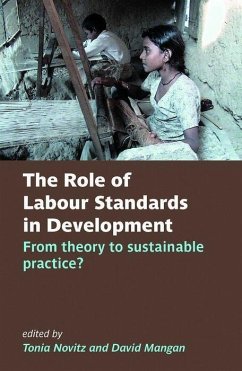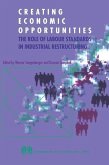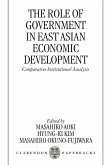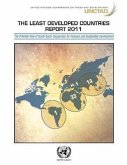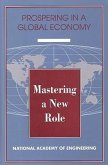The Role of Labour Standards in Development
From Theory to Sustainable Practice?
Herausgeber: Novitz, Tonia; Mangan, David
The Role of Labour Standards in Development
From Theory to Sustainable Practice?
Herausgeber: Novitz, Tonia; Mangan, David
- Broschiertes Buch
- Merkliste
- Auf die Merkliste
- Bewerten Bewerten
- Teilen
- Produkt teilen
- Produkterinnerung
- Produkterinnerung
This book considers the previously neglected intersection between work and development and considers how protection of labour standards may be understood in development terms. Examples are given of concrete achievement in anti-discrimination, child labour, trade relations and social dialogue.
Andere Kunden interessierten sich auch für
![Creating economic opportunities. The role of labour standards in industrial restructuring Creating economic opportunities. The role of labour standards in industrial restructuring]() Werner SengenbergerCreating economic opportunities. The role of labour standards in industrial restructuring61,99 €
Werner SengenbergerCreating economic opportunities. The role of labour standards in industrial restructuring61,99 €![The Role of Government in East Asian Economic Development The Role of Government in East Asian Economic Development]() Masahiko Aoki / Hyung-Ki Kim / Masahiro Okuno-Fujiwara (eds.)The Role of Government in East Asian Economic Development103,99 €
Masahiko Aoki / Hyung-Ki Kim / Masahiro Okuno-Fujiwara (eds.)The Role of Government in East Asian Economic Development103,99 €![Living Standards in the United States: A consumption-based Approach Living Standards in the United States: A consumption-based Approach]() Daniel T. SlesnickLiving Standards in the United States: A consumption-based Approach10,99 €
Daniel T. SlesnickLiving Standards in the United States: A consumption-based Approach10,99 €![On the Science of Weighing and Measuring and Standards of Measure and Weight On the Science of Weighing and Measuring and Standards of Measure and Weight]() Henry William ChisholmOn the Science of Weighing and Measuring and Standards of Measure and Weight24,99 €
Henry William ChisholmOn the Science of Weighing and Measuring and Standards of Measure and Weight24,99 €![The Least Developed Countries Report: The Potential Role of South-South Cooperation for Inclusive and Sustainable Development The Least Developed Countries Report: The Potential Role of South-South Cooperation for Inclusive and Sustainable Development]() United NationsThe Least Developed Countries Report: The Potential Role of South-South Cooperation for Inclusive and Sustainable Development61,99 €
United NationsThe Least Developed Countries Report: The Potential Role of South-South Cooperation for Inclusive and Sustainable Development61,99 €![Fiscal and Currency Standards As the Future Measure of Credit of Nations Fiscal and Currency Standards As the Future Measure of Credit of Nations]() Paul Moritz WarburgFiscal and Currency Standards As the Future Measure of Credit of Nations17,99 €
Paul Moritz WarburgFiscal and Currency Standards As the Future Measure of Credit of Nations17,99 €![Mastering a New Role Mastering a New Role]() National Academy Of EngineeringMastering a New Role52,99 €
National Academy Of EngineeringMastering a New Role52,99 €-
-
-
This book considers the previously neglected intersection between work and development and considers how protection of labour standards may be understood in development terms. Examples are given of concrete achievement in anti-discrimination, child labour, trade relations and social dialogue.
Hinweis: Dieser Artikel kann nur an eine deutsche Lieferadresse ausgeliefert werden.
Hinweis: Dieser Artikel kann nur an eine deutsche Lieferadresse ausgeliefert werden.
Produktdetails
- Produktdetails
- Verlag: Hurst & Co.
- Seitenzahl: 300
- Erscheinungstermin: 13. Januar 2012
- Englisch
- Abmessung: 231mm x 155mm x 15mm
- Gewicht: 417g
- ISBN-13: 9780197264911
- ISBN-10: 0197264913
- Artikelnr.: 33864885
- Herstellerkennzeichnung
- Produktsicherheitsverantwortliche/r
- Europaallee 1
- 36244 Bad Hersfeld
- gpsr@libri.de
- Verlag: Hurst & Co.
- Seitenzahl: 300
- Erscheinungstermin: 13. Januar 2012
- Englisch
- Abmessung: 231mm x 155mm x 15mm
- Gewicht: 417g
- ISBN-13: 9780197264911
- ISBN-10: 0197264913
- Artikelnr.: 33864885
- Herstellerkennzeichnung
- Produktsicherheitsverantwortliche/r
- Europaallee 1
- 36244 Bad Hersfeld
- gpsr@libri.de
Professor Tonia Novitz first studied law in New Zealand and qualified there as a Barrister and Solicitor, specialising in employment law and civil litigation. She then studied at Balliol College, Oxford, where she was awarded the BCL and completed her doctorate. She has been a visiting fellow at the International Institute for Labour Studies (Geneva), a Jean Monnet Fellow and a Marie Curie Fellow at the European University Institute (Florence) and a senior visiting fellow at the University of Melbourne. David Mangan is Lecturer in the Law of Obligations at the University of Leicester. Research and teaching interests include employment, tort and contract law with an emphasis on professional services. He has been a consultant in public sector labour relations and is a barrister and solicitor in Canada. His doctorate was recently completed at the London School of Economics. Publications have dealt with employment, tort and education law.
* Introduction
* Part I: Theoretical Connections between Work and Development
* Comparative institutional advantage in the context of development
* Human freedom and human capital; re-imagining labour law for
development
* Part II: Addressing social exclusion and discrimination
* Gender, equality and capabilities
* Problems of gender, violence, development and labour
* Promoting social inclusion through anti-discrimination law
* Part III: Child poverty and child labour as an obstruction to
development
* Understanding the economics of child labour
* Child labour: What "responsibility" might entail for "responsive"
corporations
* Part IV: Development through trade and/or aid?
* The very basis of our existence: labour and the neglected
environmental dimension of sustainable development
* Development, the movement of persons, and labour law: trade and aid
vs. reasonable labour market access
* Part V: Achieving development through social dialogue, corporate
social responsibility and other participatory strategies
* Corporate Social Responsibility and Participatory Labour Laws
* How social dialogue and CSR have met up with traditional
international supervision in realizing FPRW
* Big trade unions and big business: how might international framework
agreements promote sustainable development at a local level?
* Afterword
* Part I: Theoretical Connections between Work and Development
* Comparative institutional advantage in the context of development
* Human freedom and human capital; re-imagining labour law for
development
* Part II: Addressing social exclusion and discrimination
* Gender, equality and capabilities
* Problems of gender, violence, development and labour
* Promoting social inclusion through anti-discrimination law
* Part III: Child poverty and child labour as an obstruction to
development
* Understanding the economics of child labour
* Child labour: What "responsibility" might entail for "responsive"
corporations
* Part IV: Development through trade and/or aid?
* The very basis of our existence: labour and the neglected
environmental dimension of sustainable development
* Development, the movement of persons, and labour law: trade and aid
vs. reasonable labour market access
* Part V: Achieving development through social dialogue, corporate
social responsibility and other participatory strategies
* Corporate Social Responsibility and Participatory Labour Laws
* How social dialogue and CSR have met up with traditional
international supervision in realizing FPRW
* Big trade unions and big business: how might international framework
agreements promote sustainable development at a local level?
* Afterword
* Introduction
* Part I: Theoretical Connections between Work and Development
* Comparative institutional advantage in the context of development
* Human freedom and human capital; re-imagining labour law for
development
* Part II: Addressing social exclusion and discrimination
* Gender, equality and capabilities
* Problems of gender, violence, development and labour
* Promoting social inclusion through anti-discrimination law
* Part III: Child poverty and child labour as an obstruction to
development
* Understanding the economics of child labour
* Child labour: What "responsibility" might entail for "responsive"
corporations
* Part IV: Development through trade and/or aid?
* The very basis of our existence: labour and the neglected
environmental dimension of sustainable development
* Development, the movement of persons, and labour law: trade and aid
vs. reasonable labour market access
* Part V: Achieving development through social dialogue, corporate
social responsibility and other participatory strategies
* Corporate Social Responsibility and Participatory Labour Laws
* How social dialogue and CSR have met up with traditional
international supervision in realizing FPRW
* Big trade unions and big business: how might international framework
agreements promote sustainable development at a local level?
* Afterword
* Part I: Theoretical Connections between Work and Development
* Comparative institutional advantage in the context of development
* Human freedom and human capital; re-imagining labour law for
development
* Part II: Addressing social exclusion and discrimination
* Gender, equality and capabilities
* Problems of gender, violence, development and labour
* Promoting social inclusion through anti-discrimination law
* Part III: Child poverty and child labour as an obstruction to
development
* Understanding the economics of child labour
* Child labour: What "responsibility" might entail for "responsive"
corporations
* Part IV: Development through trade and/or aid?
* The very basis of our existence: labour and the neglected
environmental dimension of sustainable development
* Development, the movement of persons, and labour law: trade and aid
vs. reasonable labour market access
* Part V: Achieving development through social dialogue, corporate
social responsibility and other participatory strategies
* Corporate Social Responsibility and Participatory Labour Laws
* How social dialogue and CSR have met up with traditional
international supervision in realizing FPRW
* Big trade unions and big business: how might international framework
agreements promote sustainable development at a local level?
* Afterword

